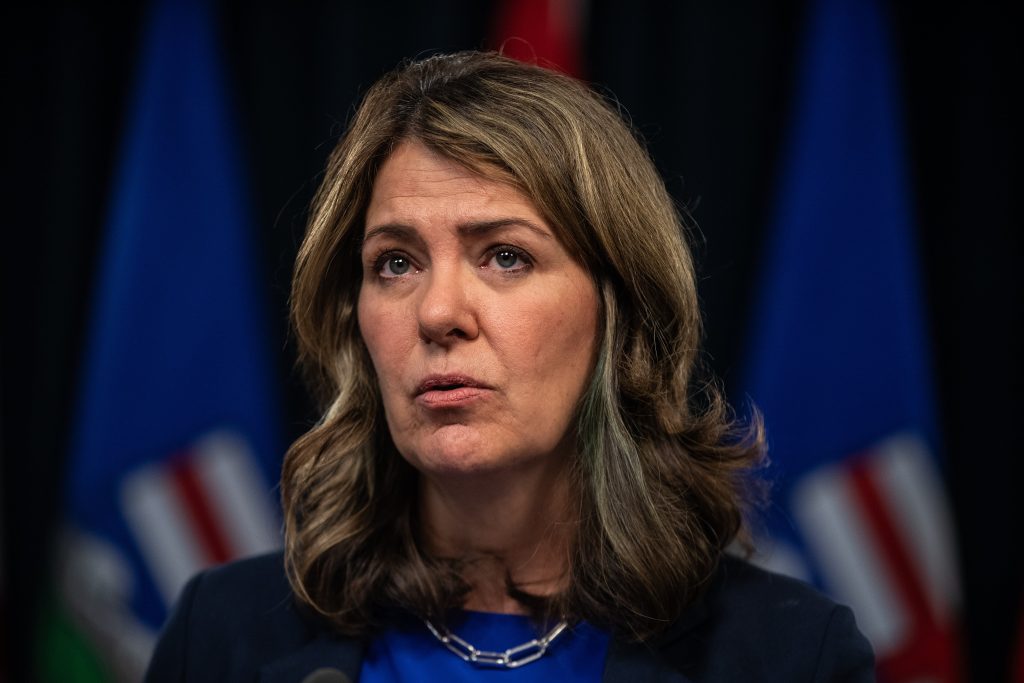Alberta Premier Danielle Smith speaks during a press conference in Edmonton, on May 6.JASON FRANSON/The Canadian Press
Alberta Premier Danielle Smith says she does not support the secession of her province from Canada, but “demonizing” the growing number of her constituents who do is not the way forward.
On Tuesday, Ms. Smith told a press conference at the provincial legislature that she would support any citizen-led petition that gets the number of signatures required to trigger a referendum, even if it puts forward the question of Alberta’s separation. The day prior, she had given a nearly 20-minute speech about her demands of Prime Minister Mark Carney’s new federal government.
Over the years, the Premier said, she has observed the separatism movement in Alberta, which she believes flared up after last week’s election, suggesting that a referendum held today would garner 30 per cent of the province’s vote. “That’s why I want to make sure those numbers do not get higher, and that those numbers end up going lower because we’re successful in negotiating a new arrangement with Canada.”
Ms. Smith, whose United Conservative Party has long had a hostile relationship with the federal Liberals, is demanding that Mr. Carney abolish restrictions on oil and gas pipelines and resource exports. She also wants reform of transfer payments under the equalization program.
“I think we’ve already seen evidence that we have a Prime Minister that’s willing to change gears. He dropped the carbon tax minutes after he got elected” as Liberal Leader, she said. “But it will take tremendous effort and co-operation to repair the damage to Alberta’s economy caused in the last 10 years by Ottawa’s destructive anti-resource agenda.”
Asked about Ms. Smith’s comments Tuesday, Mr. Carney provided a brief remark to reporters in Washington: “Canada is stronger when we work together. As an Albertan, I firmly believe that you can always ask a question, but I know what I would respond clearly.”
He declined to say anything more about a possible referendum.
The day after Mr. Carney led the Liberals to victory last week, Ms. Smith’s government introduced a bill that would make it easier for residents to force provincial referendums. She defended that bill Tuesday by saying that the bar for signatures required to trigger referendums in Alberta, albeit lower than in Saskatchewan, is on par with or higher than jurisdictions in the United States.
Asked about the scope, specifics and legal ramifications of a referendum on secession, Ms. Smith told reporters repeatedly that they were “jumping ahead a couple of steps,” which she said would require months of work. Such a referendum would likely only happen by 2026, she said.
Responding to a rebuke from First Nations in Alberta – including the Sturgeon Lake Cree Nation and Mikisew First Nation, whose chiefs say a referendum on secession would breach their treaty rights – the Premier reiterated that “it’s too early” in the process.
“I’ll wait and see what sort of referendum questions come forward, but my expectation is that those rights would be honoured,” she said. “You can’t vote away treaty rights, you can’t vote away Indigenous rights.”
Different groups have offered various ideas about what the province’s autonomy would look like, though they are “a bit undefined” about their goals, the Premier said. Should they reach more concrete objectives, she added that she will “honour the process” for their vote.
According to Alberta’s newly proposed legislation, a petition would require signatures from 10 per cent of the eligible voters in a previous general election, which is lower than the 20 per cent of registered voters previously required. Applicants would also get 120 days instead of 90 to collect the 177,000 signatures required for a referendum vote.
“I believe in free speech. I believe citizens have a right to express their opinion on things that they’re concerned about,” Ms. Smith said. “They have a right to be able to have those conversations with their friends and family and not to be demonized for it.”
In neighbouring Saskatchewan, Premier Scott Moe has said he is not interested in separating from Canada but that he, too, wouldn’t stop a public vote on the issue if it came forward.
The provincial leader of the Parti Québécois, which launched and lost two referendums on Quebec’s sovereignty in 1980 and 1995, applauded Ms. Smith Tuesday.
“This is a premier who has decided to address the government of Canada directly by saying, ‘If you do not respect our democracy, you do not respect our financial choices and our priorities, I will respond to your abuse of power with concrete actions,’” said Paul St-Pierre Plamondon, imploring Quebec Premier François Legault to follow Alberta’s example.
Meanwhile, Ontario Premier Doug Ford criticized Ms. Smith’s approach, saying now is not the time to threaten to leave the country, amid negotiations with U.S. President Donald Trump.
“We need to stay united. We’re so much stronger when we’re all sticking together,” he said Tuesday, adding that he hopes Alberta never secedes.
Ms. Smith said she has a great friendship with Mr. Ford. “But he is the Premier of Ontario, I’m the Premier of Alberta,” she said.
“I don’t tell him how he should run his province, and I would hope that he doesn’t tell me how I should run mine.”
With a report from The Canadian Press
Premier Danielle Smith is dismissing a warning from the leader of Canada’s largest province over threats of separatism from Alberta, saying he should mind his own business. Ontario Premier Doug Ford says Canada needs to be united to fight U.S. President Donald Trump’s tariffs, but Smith says she doesn’t tell Ford how to run his province and she expects the same from him. (May 6, 2025)
The Canadian Press
The post Danielle Smith says she doesn’t want to see Alberta secede from Canada appeared first on World Online.

